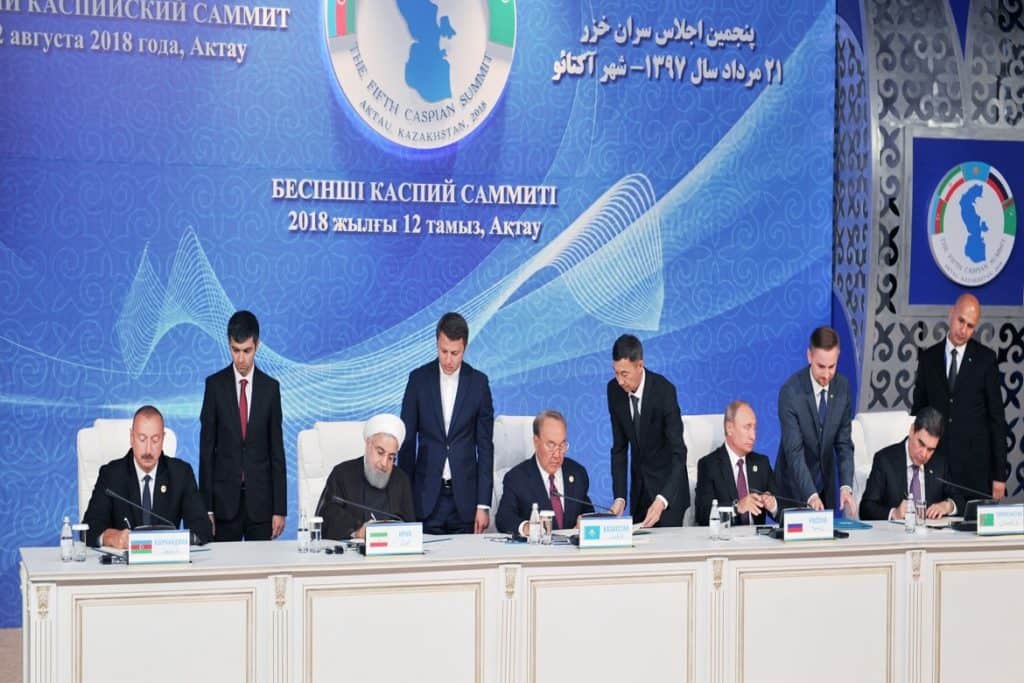After the fall of the Soviet Union, the region around the Caspian Sea faced many disputes between the newly formed states. Although there have been no major conflicts, in this region the territorial disputes have the potential to initiate various geopolitical and security complications.
One notable issue that seemed to block the further cooperation in this central Asian region was the dispute surrounding the Caspian Sea. However, with the historic agreement last month, it seems that Kazakhstan, Turkmenistan, Russia, Iran and Azerbaijan paved the way for a further improvement of the geopolitical situation in the region.
A New Frontier For Peace and Prosperity
With the dissolution of the Soviet Union, many border disputes and disagreements came back to the surface. One of those problems was the Caspian Sea. However, last month the leaders of Kazakhstan, Iran, Turkmenistan and Azerbaijan signed a historic agreement for the legal status of the Caspian Sea. The interesting segment that needs to be analyzed in this is the close cooperation between the former Soviet republics. It is well documented that Kazakhstan and Turkmenistan hold a very close economic and political ties with the Kremlin. However, the breakthrough came as a surprise to many in the Western mainstream media.
The reason behind this is the fact that the Kazakh government had its own reserves towards this kind of agreement. Moreover, the Iranian regime was not very open for this kind of agreement as they see the Caspian region as part of its historical Persian Empire. Nevertheless, the geopolitical dependence from the Russian Federation made Kazakhstan and Turkmenistan agree to this kind of framework with a relative ease.
On the bright side, this agreement has the potential to open a broad spectrum of new frontiers for these central Asian republics. The first and foremost is closely related with the political relations with the Russian Federation. For example, Kazakhstan is one of the closest allies of the Kremlin. In the same time, the former Soviet republic is also a member of the Commonwealth of the Independent States, the Shangai Agreement and the Collective Security Treaty Organization. This agreement will be significant as it will even improve the already good relations between these two regional players.
In the same time, the Caspian agreement should ease regional tensions thus opening new possibilities for economic and energy development.
According to the US Energy Information Administration, Caspian Sea contains close to 48 billion barrels of oil combined with more than 290 trillion cubic feet of natural gas. Combined with the pledge of the Russian president that this landmark should increase the military cooperation between the Caspian Nations, the benefits can be far beyond this framework. The agreement also allows the construction of a new gas pipeline on the seabed that will connect Turkmenistan and Azerbaijan thus giving cheap energy supplies.
Yet, from a military point of view, the biggest breakthrough was made on the point that forbids the Caspian Nations to allow foreign (Non-Caspian ) nations to have military assets on the Sea. This can have a great influence in the region as it can prevent certain powers (such as the USA) to build bases in the region. Moreover, it can secure the borders and can significantly decrease the potential for conflict in this central Asian region. This is especially beneficial as the region will be excluded from the potential new cold war between Russia and the United States. It will also allow Kazakhstan to maintain its role as being able to cooperate with the EU while still being in the Russian sphere of interest. In the same time, the Caspian Sea will be a stronghold for the Collective Security Treaty Organization thus increasing the traditional alliance between Kazakhstan and Russia.
In the same time, the increased cooperation between Azerbaijan and the United States had the potential to implicate tensions in the region. The Azerbaijan government concluded various agreements with the US for modernizing their army. Combined with the frozen conflict with Armenia and the US presence in Georgia, the agreement will allow Kazakhstan to become an isolated islands of stability in the region.
An Agreement for Further Agreements
And while this agreement is a step in the right direction, it still represents only the framework for further and more detailed agreements. Many geopolitical experts maintain the opinion that there are still disagreements between the Caspian States. The public opinion in Kazakhstan is somewhat convinced that the deal puts Russia as the main naval force in the Caspian Sea. The general belief is that the agreement will allow a free movement of the Russian Caspian warships. Moreover, some experts see this agreement as a way of containing the Caspian states by the Russian Fleet. These opinions are especially present in Iran and Kazakhstan.
Other experts see the increased Russian influence was detrimental in concluding this agreement by pressuring Kazakhstan, Turkmenistan and Azerbaijan to agree to the framework. This isolated Iran which had a plan for an equal division of the Caspian Sea between the Caspian nations. The bottom line is that the Caspian nations will face very complicated talks in resolving the other issues such as dividing the seabed and the construction of the gas pipelines.
Conclusion
The Caspian Sea agreement can bring many benefits to the Central Asian republics. Much of the attention is put on the Russian and the Iranian roles in concluding this framework. However, countries such as Kazakhstan, Turkmenistan and Azerbaijan can obtain a broad spectrum of benefits. From the energy and economic gains to the geopolitical and security benefits, these central Asian republics are the real winners of this deal.







